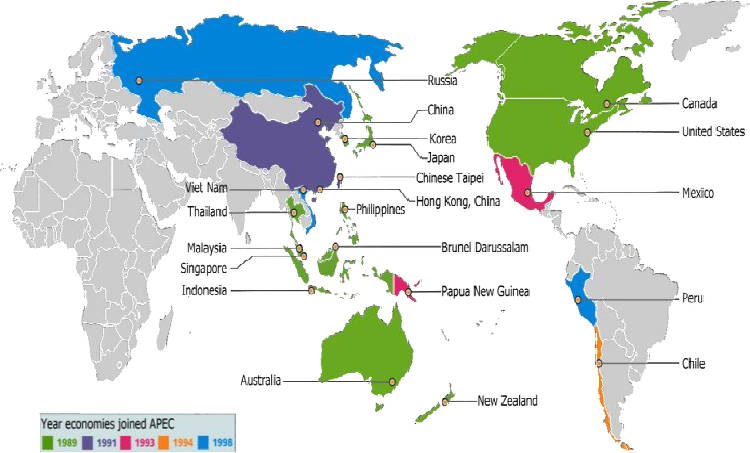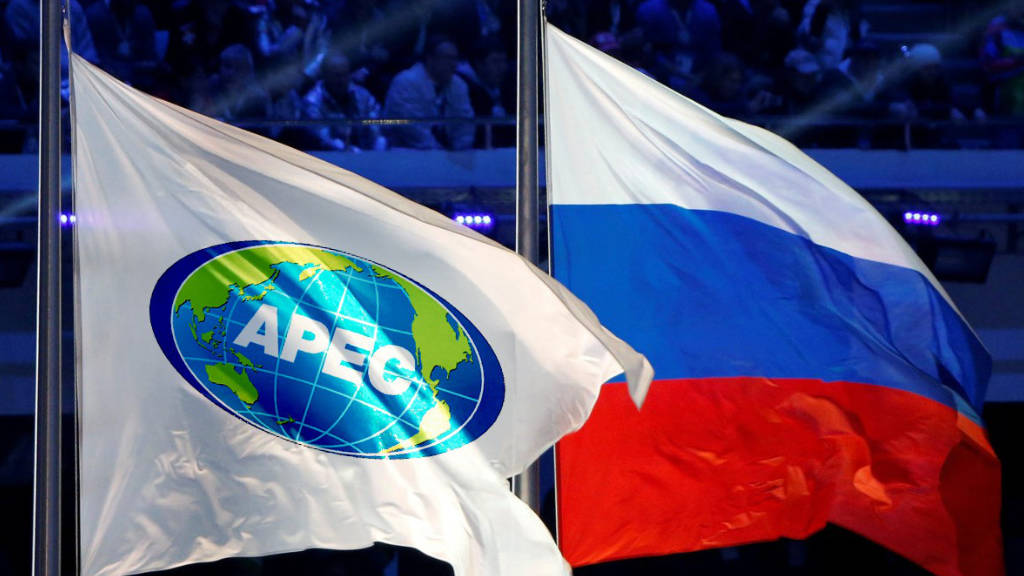The Asia-Pacific Economic Cooperation (APEC) annual summit has concluded in Lima, Peru, with Russia as a member along with Australia, Brunei, Canada, Indonesia, Japan, South Korea, Malaysia, New Zealand, the Philippines, Singapore, Thailand, the United States, Taiwan, Hong Kong, China, Mexico, Papua New Guinea, Chile, Peru, and Vietnam.
The Russian delegation was led by Deputy Prime Minister Alexei Overchuk, who stated that Moscow was satisfied with the outcome and the 2024 final declaration. He said that “Russia’s interests were taken into account in the final declaration. It ended up being quite a large document, and we are pleased with the declaration as a party to the declaration.”
He said that the declaration was adopted with a consensus among all leaders of the APEC economies.
Russian Foreign Ministry’s Ambassador-at-Large and Russia’s senior official in APEC, Marat Berdyyev also stated that “the APEC 2024 declaration is fully consensus-based and does not contain artificially politicized scenarios.” The document can be viewed here.
Anti Trade Protectionism
Overchuk said during the summit that APEC leaders had voiced concerns about increasing protectionism in international trade. “A great deal of attention was devoted to the fact that economic fragmentation is taking place right now, everyone sees it. Very grave concerns were expressed about the fact that economies are starting to protect against one another, protective measures are being introduced and this, in turn, leads to the disruption of established global value chains. The rejection of the global economy and increasing protectionism affect the efficiency of economies and labor productivity and lead to the intensification of the divide between rich and poor. The APEC discussions significantly revolved around how the advantages provided by globalization can be used to increase people’s prosperity.”
These are specific issues related to the unilateral imposition of tariffs, sanctions, and the impact of third-party sanctions on other countries’ products without referring to international arbitration and based purely on unilateral political and conflict issues, rather than multilateral trade agendas.

WTO Trade Dispute Mechanisms
Ministerial meetings at the summit discussed optimizing the work of the World Trade Organization (WTO), including the need to restart the dispute resolution mechanism. Increasing numbers of countries support Russia’s position on this issue, Deputy Economic Development Minister Dmitry Volvach stated. Attending APEC Ministers discussed a “transition to far more modern and fairer rules of global trade, world trade.”
“There are nuances to concluding the formation of the mechanism for ending disputes. Russia consistently calls for this mechanism to be created. I think that more and more countries hear us and agree with us. This was also a subject of discussion yesterday,” Volvach said, commenting on the joint meeting of APEC foreign affairs and trade ministers.
Ministers also raised the issue of concluding work on signing an APEC e-commerce agreement within the context of the WTO.
“All of us here are committed to common rules, the foundation for which are the rules in effect in the World Trade Organization. At the same time, we’re saying that it is necessary to finish up some isolated adjustments in order to meet modern requirements. This is an agreement on e-commerce. The number one priority is to get this agreement between WTO member countries signed in the near future” Volvach said.
Improved Trade Finance Structures
He also commented indirectly on the situation as concerns the use of SWIFT and third-party financial sanctions as a trade weapon, during ministerial meetings that also discussed the elimination of barriers in international trade, including issues concerning logistics and payments. “The results of our meetings, today’s and yesterday’s, will enable us to provide answers to a number of questions, practical questions, including to our participants in foreign economic activities. Everyone is concerned and the problems that our economies face, foremost the problems that the participants of our economic processes raise with us, they are the same. Various problems, issues, and barriers with both payments and logistics arise for all countries, and participants, not just Russia. Sometimes they’re objective, sometimes subjective, and they all require their own solutions. All this is being discussed, all this is on the agenda. Indeed, let’s put it this way, there is a demand for resolution of these issues.”
Russia – APEC Trade Analysis
We provide a brief bilateral trade breakdown of Russia’s bilateral trade volumes with other APEC members as follows:
| Country | 2023 Bilateral Trade Value (USD) | Imposed Sanctions |
| Australia | 1 billion | Yes |
| Brunei | 240 million | No |
| Canada | 1 billion | Yes |
| Chile | 560 million | No |
| China | 241 billion | No |
| Hong Kong | 11 billion | No |
| Indonesia | 4 billion | No |
| Japan | 9.6 billion | Yes |
| South Korea | 15 billion | Yes |
| Malaysia | 3.5 billion | No |
| Mexico | 2.4 billion | No |
| New Zealand | 100 million | Yes |
| Papua New Guinea | 5 million | No |
| Peru | 630 million | No |
| Philippines | 220 million | No |
| Singapore | 5 billion | Yes |
| Taiwan | 4 billion | Yes |
| Thailand | 1.5 billion | No |
| United States | 20 billion | Yes |
| Vietnam | 3.6 billion | No |
Summary
APEC does not include the European Union, which has been a major contributor to global and third-party sanctions impacting non-EU countries. As a result, the members of APEC were able to construct an alternative trade agenda away from Brussels’s political interference, with this showing in the declaration. The underlying theme appears to be that other nations are growing tired of the EU position. With the United States also a part of APEC this may suggest a split between US and EU attitudes towards Russia with a more pragmatic view emerging from Washington, which also signed off the APEC declaration and the points raised above. The caveat is that US politicians may just ignore their APEC statements. Nonetheless, a growing number of countries appear to be falling behind a collective criticism of the West in having Western political conflicts impacting upon trade in what are to the EU especially, remote markets. Brussels risks some isolation and pushback in emerging markets where Russia is taking a solutions-driven lead.
South Korea will take over the chairmanship of APEC in 2025.
Further Reading
Russia To Evaluate The Performance Of Its International Participation Memberships

 Русский
Русский













